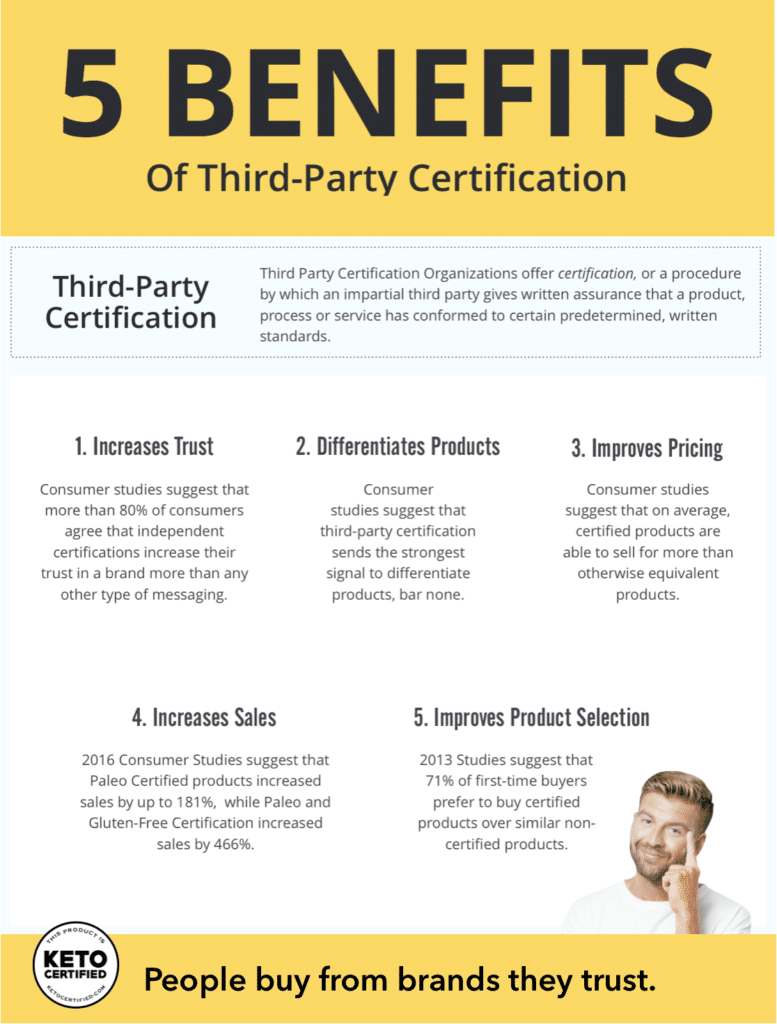Keto Certification Improves Product Differentiation

The Keto Market is growing exponentially, but it is suffering from a crisis of low product differentiation which can spell trouble for new Keto brands in the market. Keto Brands know the quality and macronutrient profiles of their products in advance, but consumers do not. While better quality, transparency, “keto food tribe alignment”, and trust signaling can increase sales and price points, brands must first communicate these attributes. Helping brands communicate these attributes and improve product differentiation between competitors is what third-party keto certification does best, bar none. Keep reading to learn how keto certification improves product differentiation and gets consumers to buy your brand first and blast through barriers to entry in the keto marketplace.
Keto Certification Improves Product Differentiation Strategy
Imagine that a buyer goes to the grocery store and picks up two avocados. While examining the two avocados, they see that both avocados look fresh, clean, and equally ripe. To the best of the consumer’s knowledge, both of the avocados are identical. However, one avocado is 20 cents more than the other. Which avocado does the average consumer choose? More often than not, they choose the avocado that is less expensive. Why would the consumer pay for what they perceive as identical products?
Unfortunately for brands, high-quality and low-quality products often appear to be identical to consumers. And, the market prices of these products are often the same, regardless of quality. It’s also unfortunate that the higher-quality products typically cost more to produce. However, if the consumer views the products as equal when there is a distinct difference in quality, the quality producer loses in these cases. Either their product is chosen less often by the average consumer, or the profit margin is lower. The market is simply not fair to the higher-quality producer.
Therefore, high-quality producers must employ different strategies to gain a competitive edge. To do so, high-quality products must be differentiated against low-quality products in order to justify the higher price to the consumer, and they must be able to communicate the difference quickly, in a way that commands their trust. That’s why third-party certification is a critical strategic asset for high-quality producers: third-party certification offers both product differentiation and trust.
This trust pays off.
Third-Party Certification Effectuates Product Differentiation Best
Brands differentiate their high-quality products from low-quality products through four signal strategies: reputation, third-party certification, warranty, and information disclosure. However, of these four signaling strategies, studies suggest that third-party certification sends the strongest signal to differentiate products, bar none.
It was also found that on average, third-party certified products were sold for more than 50% otherwise equivalent products, and could have up to a 55% price differentiation impact between certified and non-certified products. This same study found that reputation only impacted price differentiation of less than 3% and that warranties had no effect on the price of goods, whatsoever. In other words, the study suggests that the single most effective signal to differentiate products and increase sales prices was from third-party certification. It further suggests and that brand reputation and warranties although important, may not be enough to substantiate higher prices.
Keto Certification as a communication medium
Not only do third-party certifications increase trust more than claims made by the brand itself, the logos also communicate certain qualities and product attributes in an easily understandable language to the consumer, such as macronutrient profiles, and being safe for ketogenic diet adherents. This form of communication through keto certification improves market efficiency and helps consumers distinguish macronutrient attributes between similar products quickly.
Further, third-party certification effectuates a “separating equilibrium,” in which the high-quality producer becomes certified and increases their trust signaling and their prices, and the lower-quality producer must enact a different strategy. The results from this strategy occur for two reasons: low-quality producers do not meet the certifier’s requirements, and because consumers believe that certified products are more high-quality than non-certified products. In other words, certification allows consumers to tell the difference between similar products, and the certified product is more trusted to be compliant with the ketogenic diet that its non-certified counterpart.
Product differentiation and trust pay off, especially in the current keto market where product differentiation is low which can create potential barriers to entry.
Product Differentiation and the Rise of Conscientious Consumers and Food Tribalism
Another study suggests that consumers who show a distinct preference for social responsibility [2] tend to buy higher-quality, higher-priced products. In contrast, the consumers who pay less attention to social responsibility are more likely to purchase lower-priced, standard products.
These “Conscientious Consumers” are on the rise. Here’s something to chew on: a 2016 Nielsen report [3] indicated that local and regional companies were experiencing higher value growth compared to their multinational corporation counterparts: 13 percent and 23 percent from 2012 to 2014, and 5 percent respectively. In other words, the small-scale local company now has the upper-hand over the multinational corporations that were once at the top of the business food chain. In this new food landscape, product differentiation and alignment with growing keto industry won’t just be a strategy; it has the potential to make or break a brand.
With both conscientious consumerism and “food tribalism” on the rise, keto brands of all sizes should consider the benefits of a keto certification strategy that improves trust signaling and transparency, communicates macronutrients quickly and effectively with ease to the consumer, that is aligned with the growing demographics and keto diet food tribe.
Click Here to Improve your product differentiation with Keto Certification from KetoCertified.com now!
References
1. M. Dewally and L. Ederington, “A comparison of reputation, certification, warranties, and disclosure as remedies for information asymmetries: lessons from the comic book market,” 2002.
2. K. Conrad, “Price competition and product differentiation when consumers care for the environment,” Environmental and Resource Economics, vol. 31, no. 1, pp. 1–19, 2005.
3.Go Local to Win the Hears and Carts of Southeast Asian Consumers. (2016) Nielsen Go Local Report. 6-10. Retrieved from https://www.nielsen.com/content/dam/nielsenglobal/apac/docs/reports/2016/nielsen-go-glocal-report.pdf
